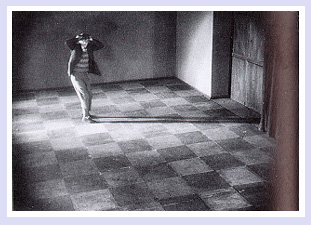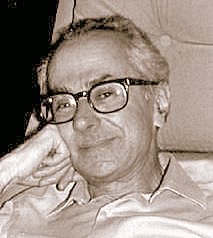Force Field of Dreams
Metaphysics and chess in today's New York Times Magazine:
-
From "Must-See Metaphysics," by Emily Nussbaum:
Joss Whedon, creator of a new TV series —
"I'm a very hard-line, angry atheist" and
"I want to invade people's dreams."
-
From "Check This," by Wm. Ferguson:
Garry Kasparov on chess —
"When the computer sees forced lines,
it plays like God."
Putting these quotations together, one is tempted to imagine God having a little game of chess with Whedon, along the lines suggested by C. S. Lewis:
As Lewis tells it the time had come for his "Adversary [as he was wont to speak of the God he had so earnestly sought to avoid] to make His final moves." (C. S. Lewis, Surprised by Joy, Harcourt, Brace, and World, Inc., 1955, p. 216) Lewis called them "moves" because his life seemed like a chess match in which his pieces were spread all over the board in the most disadvantageous positions. The board was set for a checkmate….
For those who would like to imagine such a game (God vs. Whedon), the following may be helpful.
George Steiner has observed that
The common bond between chess, music, and mathematics may, finally, be the absence of language.
This quotation is apparently from
Fields of Force:
Fischer and Spassky at Reykjavik. by George Steiner, Viking hardcover, June 1974.
George Steiner as quoted in a review of his book Grammars of Creation:
"I put forward the intuition, provisional and qualified, that the 'language-animal' we have been since ancient Greece so designated us, is undergoing mutation."
The phrase "language-animal" is telling. A Google search reveals that it is by no means a common phrase, and that Steiner may have taken it from Heidegger. From another review, by Roger Kimball:
In ''Grammars of Creation,'' for example, he tells us that ''the classical and Judaic ideal of man as 'language animal,' as uniquely defined by the dignity of speech . . . came to an end in the antilanguage of the death camps.''
This use of the Holocaust not only gives the appearance of establishing one's credentials as a person of great moral gravity; it also stymies criticism. Who wants to risk the charge of insensitivity by objecting that the Holocaust had nothing to do with the ''ideal of man as 'language animal' ''?
Steiner has about as clear an idea of the difference between "classical" and "Judaic" ideals of man as did Michael Dukakis. (See my notes of September 9, 2002.)
Clearly what music, mathematics, and chess have in common is that they are activities based on pure form, not on language. Steiner is correct to that extent. The Greeks had, of course, an extremely strong sense of form, and, indeed, the foremost philosopher of the West, Plato, based his teachings on the notion of Forms. Jews, on the other hand, have based their culture mainly on stories… that is, on language rather than on form. The phrase "language-animal" sounds much more Jewish than Greek. Steiner is himself rather adept at the manipulation of language (and of people by means of language), but, while admiring form-based disciplines, is not particularly adept at them.
I would argue that developing a strong sense of form — of the sort required to, as Lewis would have it, play chess with God — does not require any "mutation," but merely learning two very powerful non-Jewish approaches to thought and life: the Forms of Plato and the "archetypes" of Jung as exemplified by the 64 hexagrams of the 3,000-year-old Chinese classic, the I Ching.
For a picture of how these 64 Forms, or Hexagrams, might function as a chessboard,
click here.
Other relevant links:
"As you read, watch for patterns. Pay special attention to imagery that is geometric…"
and

from Shakhmatnaia goriachka















